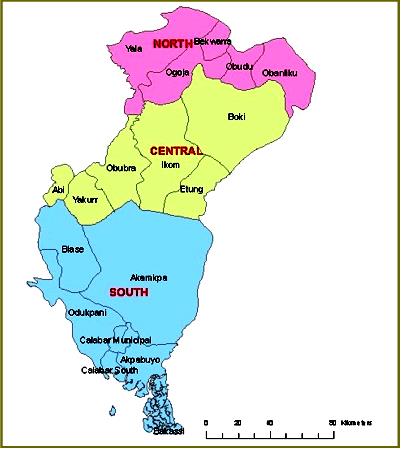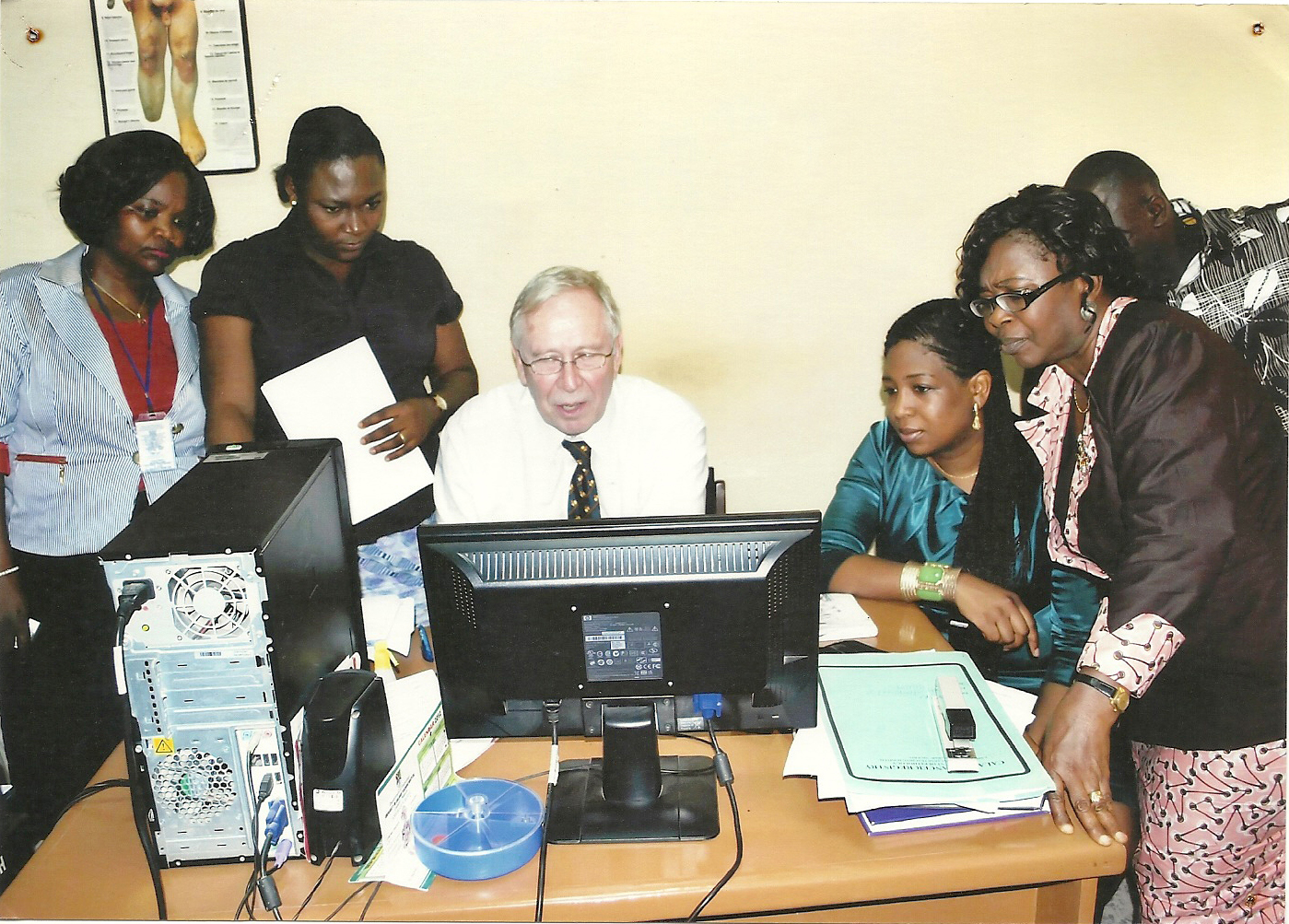TYPE OF REGISTRY AND DATE ESTABLISHED:
The Calabar Cancer Registry started as a hospital-based registry in 1979 then became population-based in 2004. It is located in the Department of Pathology, University of Calabar Teaching Hospital (UCTH), Calabar, Cross River state, Nigeria.
The registry received its first equipment from the national headquarters of cancer registries in Nigeria coordinated by professor T.F.Solanke in June 1994. This was followed by a grant from WHO/IARC for 2004-2006. In 2009, a set of computer and accessories was donated by the Federal Ministry of Health, Abuja. Since 2007, the registry has had no regular source of funding.
The registry is led by a consultant pathologist as the director, and staffed by a principal administrative officer as the acting registrar, a senior clerical officer as the data collector and data-entry clerk, a medical social worker in charge of patients’ counselling. There is also an oncology nurse who counsels patients on the detection of early warning signals of cancer and assists during the collection of cervical smear and breast biopsy in the cytology clinic.
Registration is predominantly active, involving visits to all the health institutions within the area of coverage. The registration area includes the following Local Government Areas(LGAS): Akamkpa, Akpabuyo, Biase, Calabar Municipality, Calabar South and Odukpani. Population-coverage is considered to be relatively complete for two of these: Calabar South & Calabar Municipality, with a population (2006 national population census) of 375,196. Based on a projected population of 501,400 in 2016, an estimate for 2016/7 was prepared assuming a constant growth of 2.9% within each age-sex group. The population is composed of three major ethnic groups, the Efik, the Ejagham and the Bekwarra.
Regular visits are made to the hospital wards, health records department and laboratory departments including the haematology day care clinic at the UCTH. For logistic reasons, data collection is limited to the health facilities (such as government tertiary, secondary and primary health centres, private hospitals, clinics and laboratories) located in only three local government areas: Akpabuyo, Calabar Municipality and Calabar South.

Map of Cross River State
The information on the patient and the tumour is abstracted from the patients’ health records, laboratory reports, in-patients’ and clinic attendance records. Date last seen or of death is also obtained. When applicable, autopsy records are also examined for available data on cancer-related deaths. Presently, there is no mandatory death registration in Nigeria; only death certificates issued in hospitals are used for updating the vital status of the cancer cases.
To ensure quality control, as far as possible, histological confirmation is obtained in cases registered. All entries are cross-checked validated and updated regularly by the director. The cancers are coded according to ICD-O. New cancer cases registered are stored and managed with Canreg4, and Canreg5 recently. Access to the computerised data is restricted essentially to a few persons. The patients’ data on a paper form is kept securely in locked cabinets. Strict confidential practice is maintained throughout the data handling processes and the cancer registry office and documents are out of bounds to non-registry staff. No information is divulged from the registry without a written request and due authorisation by the director.

AFCRN visit in Nov 2012. CCR staff from left to right: Mrs Ejen Anah, Favour Ofor, Mr Joel Bassey and Prof Ima Obong Ekanem, Director, CCR)
BRIEF RESULTS FROM 2016-2017


PUBLICATIONS FROM THE REGISTRY:
- Elima E Jeddy – Agba, Maria-Paula Curado, Emmamuel Oga, Modupeola O.Samaila, Emmamuel R, Ezeome, Christopher Obiorah, Adebayo Ojo, Ima-Obong A. Ekanem,g, Cornelius Ukah, Ahmed Mayuni, Enoch A. Afolayanj, Popoola Abiodunk, Babatunde J. Olasodel, Abidemi Omonisil, Theresa Otum,Patience Osinubin, Patrick Dakuma, William Blattnero, Clement A. Adebamowoa, oThe role of hospital-based cancer registries in low and middle income countries—The Nigerian Case Study Cancer Epidemiology :Available online 15 June 2012
- Godwin A Ebughe1*, Ima-Obong Ekanem1, Ayodele J Omotoso1, Marcus Inyama2, Thomas U Agan3, B U Ago3,A Ibanga4, Dennis Nkanga4, U Etiuma5, Grace Inah6 Malignancies in AIDS patients: the experience of a tertiary hospital in a high prevalence zone Infectious Agents and Cancer 2012 7(Suppl 1):P17.
- Marcus A Inyama1*, IA Ibanga1, Godwin Ebughe2, I Bassey2, Ima-Obong Ekanem2, ME Asuquo3 AIDS-related lymphoma at the University of Calabar Teaching Hospital (Nigeria): a seven year review Infectious Agents and Cancer 2012 7(Suppl 1):P1
- Ekanem IA, Parkin DM. Five year cancer incidence In Calabar, Nigeria (2009-2013). Cancer Epidemiol. 2016 Jun;42:167-72.
- Odutola MK, Jedy-Agba E, Oga E, Igbinoba F, Otu T, Ezeome E, Ekanem I, Hassan R, Adebamowo C. Cancers attributable to infectious agents in Nigeria: 2012-2014 journal of global oncology 2 (3_suppl), 77s-78s, 2016
- Ebughe GA, Ekanem IA, Omoronyia OE, Omotoso AJ, Ago BU, Agan TU & Ugbem TI. Incidence of cervical cancer in Calabar, Nigeria. Journal of Cancer and Tumor International 3(2): 1-13, 2016
- Ebughe GA, Ekanem IA, Omoronyia OE, Nnoli MA, Ikpi EE, Ugbem TI. Prostate Cancer Incidence in Calabar-Nigeria. British Journal of Medicine and Medical Research 14 (5), 1, 2016
- Jedy-Agba E, Dareng E, Oga E, Odutola M, Adebamowo S, Igbinoba F, Out T, Ezeome E, Ekanem IA, Hassan R, Adebamowo C The burden of human papilloma virus associated cancers in Nigeria 2012–2014. JAIDS, Journal of Acquired Immune Deficiency Syndromes 71, 79, 2016
- Ekanem I-O, Asuquo M, Odey F. Cancers in childhood and young adults in Calabar, Nigeria (2009-2013) American Journal of Clinical Pathology 2018;150:s90-s92
Director’s Contact details:
Prof. Ima-Obong A. Ekanem
Department of Pathology
University of Calabar Teaching Hospital
P.M.B. 1278
Calabar – Cross River State
Nigeria
Email: This email address is being protected from spambots. You need JavaScript enabled to view it.
ACKNOWLEDGMENT:
We sincerely thank the Management of the University of Calabar Teaching Hospital (UCTH) for her various forms of support in the running of the Registry and in particular, the Chief Medical Director, Dr. Thomas Agan who has always been there for us.
We also specially thank the Institute of Human Virology Nigeria (IHVN), the Federal Ministry of Health and the International Agency for Research on Cancer (IARC) for their assistance to the Registry at different times.
BY: PROF. IMA-OBONG EKANEM
DIRECTOR, CALABAR CANCER REGISTRY
07/10/2019
